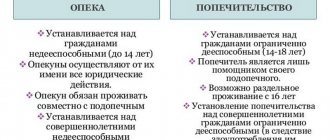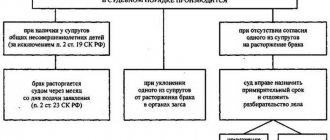The activities of the guardianship and trusteeship authorities (TCA) are regulated by Federal Law 48, consisting of 32 articles and 8 chapters. It explains general concepts, rights and responsibilities of authorized persons (guardians, trustees) and other nuances. The regulatory legal act was approved on April 24, 2008. To comply with current realities, the government annually makes adjustments to the legislative framework. You can see changes in laws, official comments from authorized persons and upcoming bills on websites dedicated to legal topics.
Legal regulation
Article 2 of Federal Law No. 48 provides the basic concepts used in the normative act. What is guardianship? According to the Law, this is a special type of placement of minor citizens with guardians who are citizens of the Russian Federation. Representatives are appointed by the relevant authorities. Their status as legal representatives of a minor is determined. The entire set of legally significant actions carried out by guardians in relation to a child is called guardianship.
The concept of guardianship is somewhat different from guardianship. According to the Law, this is a special type of placement for minor citizens who are not minors (aged from 14 to adulthood). Legal representatives of an incapacitated person appointed by state bodies must assist in every possible way in the implementation of the rights and obligations of the ward. A citizen under the care of legal representatives is called a ward.
Key differences between guardianship and adoption
The main difference is the fact that during adoption the child is legally equal to his own child, but during guardianship the rights are limited. When adopted, a child can receive the surname of his adoptive parents, but during guardianship - not. Adoptive parents can be deprived of their parental rights. The guardian is paid social benefits, while in the case of adoption no benefits are accrued.
Objectives and principles of state regulation
In accordance with 48-FZ “On guardianship and trusteeship,” government authorities must assist juvenile institutions in every possible way. Thus, the tasks of state regulation should include:
- ensuring the execution of their powers by guardians and trustees;
- ensuring an optimal standard of living for persons under their care;
- ensuring high-quality identification of citizens in need of guardianship or guardianship;
- protection of freedoms, rights and legitimate interests of wards;
- state support for legal entities and individuals whose responsibilities include stimulating the activities of guardianship and trusteeship.
Federal Law No. 48 (as amended on November 28, 2015) also establishes the basic principles of the activity in question. It is worth highlighting here:
- careful supervision over the performance of duties by guardians and trustees;
- protection of the rights and interests of wards;
- free acceptance by citizens of their responsibilities in the area under consideration.
It is also worth talking about the responsibilities and rights of the relevant government bodies.
Guardians and trustees: their rights, features of appointment
Federal Law No. 48 regulates the activities of guardians and trustees. The basic requirements for guardians are prescribed in the Civil and Family Codes of the Russian Federation. Representatives of state trustee bodies are competent to make inquiries to the police, medical institutions and other organizations to establish the identity of a potential trustee.
A potential patron can be required to prepare only those certificates that he can take in accordance with the Law of the Russian Federation. All documentation for registration of guardianship must be submitted free of charge.
First of all, close relatives are considered for the role of guardian or trustee: mother, father, grandmother, grandfather, brother, sister, uncle or aunt. If disagreements arise between the wards of one trustee, the guardianship authorities must provide each citizen in need of care with a temporary guardian until the dispute is resolved.
Only one person can look after a person under his care. One citizen takes care of only one person, with the exception of situations when brothers or sisters are given custody.
More guardians can be registered in exceptional cases by state trustee bodies. At the same time, they will all have to protect the rights of the patronized equally. Responsibility for providing medical care, providing education, and upbringing should be distributed evenly among caregivers.
When appointing guardians, you must be guided by the Family and Civil Code of the Russian Federation. The guardianship authorities have a month to find a guardian. A person who has submitted a written application or agreed to the appointment to the position can apply.
If a person for care is not found within a month, the functions of a guardian are performed by a guardianship body geographically located in the place of residence of the citizen in need of guardianship care.
When placing a ward in special institutions for training, treatment, or receiving social assistance, the guardian does not stop performing his duties. A person under guardianship is sometimes placed to live in a specialized institution, and the functions of a guardian and trustee are assigned to representatives of this organization.
The relationship between the guardian and the patronized is formalized in the form of an act of state guardianship authorities. It specifies the period of time for which the duties of the guardian will be performed.
This document can be challenged in court by relatives of a citizen in need of guardianship care. In accordance with the Federal Law, if the guardianship authorities did not appoint a guardian or trustee on time and thereby caused harm to the citizen, compensation is paid.
It is practiced to appoint a temporary guardian if circumstances force it. An adult guardian with legal capacity is appointed for both permanent and temporary guardianship. The potential patron must provide identification and allow the personal residence to be inspected to determine whether the person under his or her care can live there. There is no need to collect other certificates.
Guardians and trustees acting temporarily have the same rights and obligations as permanent ones. The exception is transactions with the property of the ward. Temporary guardianship can be granted for two months.
How is a guardian or trustee appointed?
A guardian can be appointed at the request of the mother and father, if there are compelling reasons for this. In the application, parents indicate the potential guardian and the length of time required for guardianship. The mother or father can appoint a guardian in the event of their own death if there is no other parent. The application is certified by a signature and certified by a third party: a representative of the trustee bodies, the boss, the chief physician, etc. The application may be changed several times.
A minor citizen who needs one can choose a guardian by writing an application and accurately indicating the person. If the appointment of a guardian contradicts the legislation of the Russian Federation or this Federal Law, his appointment can be refused.
According to Federal Law No. 48, it is possible to formalize guardianship through an agreement with a potential guardian. Guardianship authorities cannot evade the execution of an agreement without good reason. Once the papers are signed, the guardian can begin to perform his duties.
The Federal Law on Guardianship and Trusteeship protects the rights of guardians. The Family Code of the Russian Federation regulates issues of upbringing and education of minors. A guardian is the legal representative of the patronized person and protects all his interests. Guardian - promotes the protection of the rights of the minor under guardianship, controls the transactions being carried out.
When registering guardianship, the documents can specify special requirements for the implementation of the duties of the guardian, which will prohibit certain actions. If a guardian or trustee is forced to change the place of residence of the ward, they are obliged to notify the state trustee authorities.
According to the Law of the Russian Federation, guardianship and trusteeship must be provided free of charge. The work of a guardian or trustee may be paid in exceptional cases. The guardian can count on reimbursement of costs from the income of the ward. The guardian can be remunerated from the funds of the ward or from the budgetary funds of the Russian Federation.
If the patron is interested in the gratuitous use of the property of the ward, he has the right to ask for this instead of rewarding the performance of duties. The specifics of the use of the property are specified in the contract.
Rights and responsibilities of guardianship and guardianship authorities
Law 48-FZ “On Guardianship” in Chapter 2 establishes the main powers and tasks of government bodies exercising powers in the area under consideration. What kind of authorities are these? According to Article 6, these are regional executive authorities.
The duties of such bodies include the following:
- protection of freedoms, rights and legitimate interests of persons who need guardianship or trusteeship from citizens;
- high-quality supervision over the performance of their duties by guardians and trustees;
- control over the preservation of the property of minors under the supervision of relevant persons or organizations.
It is also worth noting that, in accordance with 48-FZ “On Guardianship and Trusteeship”, the state authorities in question have the following types of rights:
- appeal to the courts with a statement on the need to recognize individual citizens as incompetent or partially capable;
- legal release of trustees or guardians from the performance of their duties;
- representing the interests of minors during legal proceedings;
- issuance of permits for joint or separate residence of trustees or guardians with wards;
- checking living conditions in the places where the wards live, as well as some other powers.
The law, therefore, clearly regulates the main provisions related to the legal status of all subjects of the normative act.
Ministry of Social Development, Guardianship and Trusteeship of the Irkutsk Region
Regulatory legal acts of the Russian Federation regulating guardianship, trusteeship and patronage of certain categories of adult citizens:
Civil Code of the Russian Federation (part one)
Federal Law of April 24, 2008 No. 48-FZ “On Guardianship and Trusteeship”
Law of the Russian Federation of July 2, 1992 No. 3185-1 “On psychiatric care and guarantees of the rights of citizens during its provision”
Decree of the Government of the Russian Federation of November 17, 2010 No. 927 “On certain issues of guardianship and trusteeship in relation to adult incompetent or partially incompetent citizens”
Order of the Ministry of Health and Social Development of the Russian Federation dated August 8, 2011 No. 891n “On the implementation of paragraph 17 of the rules for the selection, registration and training of citizens who have expressed a desire to become guardians or trustees of adult incompetent or not fully capable citizens, approved by the Decree of the Government of the Russian Federation of November 17 2010 No. 927"
Guidelines:
Guidelines for compliance with mandatory requirements in the field of guardianship and trusteeship in relation to adult incapacitated or partially incompetent citizens, developed by the Federal Service for Labor and Employment (2017)
Regulatory legal acts of the Irkutsk region regulating certain issues of guardianship, trusteeship, patronage of certain categories of adult citizens
:
Regulations on the Ministry of Social Development, Guardianship and Trusteeship of the Irkutsk Region, approved by Decree of the Government of the Irkutsk Region dated September 18, 2009 No. 261/40-pp
Administrative regulations for the provision of state aid, approved by order of the Ministry of Social Development, Guardianship and Trusteeship of the Irkutsk Region dated April 5, 2012 No. 43-mpr
Administrative regulations for the provision of state aid, approved by order of the Ministry of Social Development, Guardianship and Trusteeship of the Irkutsk Region dated April 19, 2012 No. 55-mpr
Administrative Regulations “Issuing preliminary permission to a guardian to conclude, or to a trustee to give consent to conclude an agreement on the transfer of the ward’s property for use for a period of more than five years in the presence of circumstances indicating the special benefit of such an agreement, unless a different deadline is established by federal law” , approved by order of the Ministry of Social Development, Guardianship and Trusteeship of the Irkutsk Region dated May 16, 2012 No. 89-mpr
Administrative regulations for the provision of state aid, approved by order of the Ministry of Social Development, Guardianship and Trusteeship of the Irkutsk Region dated May 18, 2012 No. 99-mpr
Administrative regulations for the provision of state aid, approved by order of the Ministry of Social Development, Guardianship and Trusteeship of the Irkutsk Region dated May 18, 2012 No. 113-mpr
Administrative regulations for the provision of state aid, approved by order of the Ministry of Social Development, Guardianship and Trusteeship of the Irkutsk Region dated June 26, 2012 No. 176-mpr"
→ Guardianship
A citizen who, due to a mental disorder, cannot understand the meaning of his actions or manage them, may be declared incompetent by the court in the manner established by civil procedural legislation. Guardianship is established over him.
Guardianship is a form of arrangement for minor citizens (minor citizens under the age of fourteen) and citizens recognized by the court as incompetent, in which citizens (guardians) appointed by the guardianship and trusteeship authority are the legal representatives of the wards and perform on their behalf and in their interests all legally significant actions .
→ Guardianship
A citizen who, due to the abuse of alcoholic beverages or drugs, puts his family in a difficult financial situation, may be limited by the court in legal capacity in the manner established by civil procedural legislation. Guardianship is established over him.
Guardianship is a form of arrangement for minor citizens aged fourteen to eighteen years and citizens limited by the court in legal capacity, in which citizens (trustees) appointed by the guardianship and trusteeship authority are obliged to provide minor wards with assistance in the exercise of their rights and fulfill their duties, to protect minor wards from abuse on the part of third parties, as well as to give consent to adult wards to carry out transactions, with the exception of small household ones, to receive earnings, pensions and other income and dispose of them.
A citizen whose legal capacity is limited by a court independently bears property liability for the transactions he has made and for the damage he has caused.
→ Patronage
Patronage is established over an adult capable citizen who, for health reasons, is not able to independently exercise and protect his rights and fulfill his duties.
Within a month from the date of identification of an adult capable citizen who, for health reasons, cannot independently exercise and protect his rights and fulfill his duties, an assistant is assigned to him by the guardianship and trusteeship body. An assistant can be appointed with his consent in writing, as well as with the consent in writing of the citizen over whom patronage is established. An employee of an organization providing social services to an adult capable citizen who needs to establish patronage over him cannot be appointed as an assistant to such a citizen.
An assistant to an adult capable citizen performs actions in the interests of a citizen under patronage on the basis of an agency agreement, a property trust management agreement, or another agreement concluded with this person.
The guardianship and trusteeship body exercises control over the fulfillment of his duties by the assistant of an adult capable citizen and notifies the citizen under patronage of violations committed by his assistant and which are the basis for termination of the agency agreement, property trust management agreement or other agreement concluded between them.
→ Document forms
— Application from a citizen who has expressed a desire to become a guardian or trustee of an adult incapacitated or not fully capable citizen.
— Application for the appointment of an assistant.
— Application for appointment as an assistant.
— Form of a guardian’s report on the storage, use of the property of an adult incapacitated citizen and the management of this property.
— Form of a trustee’s report on the use of the property of an adult citizen who is not fully capable and the management of this property.
→ List of documents that must be submitted to the guardianship and trusteeship authority by a citizen who has expressed a desire to become a guardian (trustee) of an adult citizen recognized by the court as incompetent (partially incompetent)
A citizen who has expressed a desire to become a guardian
, submits the following documents to the guardianship and trusteeship authority at the place of residence:
a) an application for appointment as a guardian, submitted in the form of a document on paper or in the form of an electronic document;
b) a certificate from the place of employment indicating the position and the average salary for the last 12 months, and for citizens who are not in an employment relationship - another document confirming income (for pensioners - copies of a pension certificate);
c) a medical report on the state of health based on the results of an examination of a citizen who has expressed a desire to become a guardian, issued in the manner established by the Ministry of Health of the Russian Federation;
d) a copy of the marriage certificate (if the citizen who has expressed a desire to become a guardian is married);
e) written consent of adult family members, taking into account the opinion of children who have reached the age of 10, living together with a citizen who has expressed a desire to become a guardian, for the cohabitation of an adult ward with a guardian (if the guardian decides on the cohabitation of an adult ward with the guardian’s family) ;
f) a document confirming that a citizen who has expressed a desire to become a guardian has undergone training in the manner established by these Rules (if any);
g) autobiography.
A citizen who has expressed a desire to become a guardian must present a passport or other identification document when submitting an application for appointment as a guardian.
A citizen who has expressed a desire to become a guardian (trustee), who is a close relative of an incapacitated citizen, with whom he has permanently lived together for at least 10 years on the date of filing an application for appointment as a guardian
, submits the following documents to the guardianship and trusteeship authority at the place of residence:
— application for appointment as a guardian, submitted in the form of a document on paper or in the form of an electronic document;
— documents confirming relationship with an adult ward;
- a medical report on the state of health based on the results of a medical examination of a citizen who has expressed a desire to become a guardian, issued in the manner established by the Ministry of Health of the Russian Federation;
- a copy of the marriage certificate (if the close relative who has expressed a desire to become a guardian is married).
→ Rights and obligations of guardians, trustees, assistants
List of basic rights and responsibilities of a guardian of an adult citizen declared incompetent by a court:
1. The guardian acts in defense of the rights and interests of his ward in relations with any persons, including in the courts, without special authority (clause 2 of Article 31 of the Civil Code of the Russian Federation).
2. The guardian is the representative of the ward by force of law and makes all necessary transactions on his behalf and in his interests (clause 2 of Article 32 of the Civil Code of the Russian Federation; clause 2 of Article 15 of the Federal Law of April 24, 2008 No. 48-FZ “On Guardianship and trusteeship").
3. The guardian is obliged to accept the property of the ward according to the inventory from the persons who stored it within three days from the moment their rights and obligations arise (clause 1 of Article 18 of the Federal Law of April 24, 2008 No. 48-FZ “On Guardianship and Trusteeship”).
4. The guardian is obliged to take care of the maintenance of his ward, to provide him with care and treatment, to protect his rights and interests (clause 3 of Article 36 of the Civil Code of the Russian Federation).
5. The guardian does not have the right of ownership of the ward’s property, including the amounts of alimony, pensions, benefits and other social payments provided for the maintenance of the ward (clause 1 of Article 17 of the Federal Law of April 24, 2008 No. 48-FZ “On Guardianship and Trusteeship” ").
6. The guardian does not have the right to use the property of the ward in his own interests, except for cases of using the property of the ward with the permission of the guardianship and trusteeship authority (clause 4 of Article 17 of the Federal Law of April 24, 2008 No. 48-FZ “On Guardianship and Trusteeship”).
7. If necessary, if the interests of the ward require it, the guardian is immediately obliged to file a claim in court to recover the ward’s property from someone else’s illegal possession or take other measures to protect the property rights of the ward (clause 4 of Article 18 of the Federal Law of April 24, 2008 No. 48- Federal Law “On Guardianship and Trusteeship”).
8. The guardian is obliged to take care of the ward’s property transferred to him as if it were his own, to prevent a decrease in the value of the ward’s property and to facilitate the extraction of income from it. The fulfillment by the guardian of these duties is carried out at the expense of the property of the ward (clause 5 of Article 18 of the Federal Law of April 24, 2008 No. 48-FZ “On Guardianship and Trusteeship”).
9. The guardian does not have the right, without the prior permission of the guardianship and trusteeship body, to carry out transactions involving the alienation, including the exchange or donation of the ward’s property, leasing it, for free use or as a pledge, transactions entailing the renunciation of the rights belonging to the ward, division of his property or separation from his shares, as well as any other transactions entailing a decrease in the property of the ward (clause 2 of Article 37 of the Civil Code of the Russian Federation, clause 1 of Article 21 of the Federal Law of April 24, 2008 No. 48-FZ “On Guardianship and Trusteeship” ).
10. The guardian, his (her) spouse and close relatives do not have the right to enter into transactions with the ward, with the exception of transferring property to the ward as a gift or for free use, as well as to represent the ward when concluding transactions or conducting court cases between the ward and the spouse. guardian and their close relatives (clause 3 of Article 37 of the Civil Code of the Russian Federation).
11. The guardian has the right to deposit the ward’s funds only into credit organizations, at least half of the shares (shares) of which belong to the Russian Federation (clause 3 of Article 19 of the Federal Law of April 24, 2008 No. 48-FZ “On Guardianship and Trusteeship”).
12. The guardian does not have the right to enter into a credit agreement or a loan agreement on behalf of the ward who is the borrower, except in cases where the loan is required for the purpose of maintaining the ward or providing him with living quarters. A credit agreement, a loan agreement on behalf of the ward in these cases are concluded with the prior permission of the guardianship and trusteeship authority (clause 4 of Article 19 of the Federal Law of April 24, 2008 No. 48-FZ “On Guardianship and Trusteeship”).
13. The guardian does not have the right to enter into an agreement on the transfer of the ward’s property for use if the period of use of the property exceeds five years. In exceptional cases, the conclusion of an agreement on the transfer of the ward’s property for use for a period of more than five years is permitted with the prior permission of the guardianship and trusteeship authority if there are circumstances indicating a special benefit of such an agreement (clause 6 of Article 19 of the Federal Law of April 24, 2008 No. 48- Federal Law “On Guardianship and Trusteeship”).
14. The guardian is obliged to notify the guardianship and trusteeship authorities of a change of residence no later than the day following the day the ward leaves the previous place of residence (clause 2 of article 36 of the Civil Code of the Russian Federation, clause 5 of article 15 of the Federal Law of April 24, 2008 No. 48- Federal Law “On Guardianship and Trusteeship”).
15. If the grounds on which the citizen was declared incompetent have disappeared, the guardian is obliged to petition the court to recognize the ward as legally competent (clause 5 of Article 36 of the Civil Code of the Russian Federation).
16. The guardian may be released from the performance of his duties at his request (clause 2 of Article 39 of the Civil Code of the Russian Federation, clause 3 of Article 29 of the Federal Law of April 24, 2008 No. 48-FZ “On Guardianship and Trusteeship”).
17. The guardian annually, no later than February 1 of the current year, unless another period is established by the agreement on guardianship or trusteeship, submits to the guardianship and trusteeship body a report in writing for the previous year on the storage, use of the ward’s property and on the management of the ward’s property with an appendix documents (copies of sales receipts, receipts for payment of taxes, insurance amounts and other payment documents (clause 1 of Article 25 of the Federal Law of April 24, 2008 No. 48-FZ “On Guardianship and Trusteeship”).
- in the guardian’s report on the storage, use of the property of an adult incapacitated citizen and the management of this property, it is not required to indicate the amounts of pensions received during the reporting period and other social payments belonging to the ward, if the guardian is a close relative from among parents, grandparents, brothers , sisters, children and grandchildren.
18. Guardians are liable for transactions made on behalf of the wards in the manner established by civil law (clause 1 of Article 26 of the Federal Law of April 24, 2008 No. 48-FZ “On Guardianship and Trusteeship”).
19. Guardians are responsible for harm caused through their fault to the person or property of the ward, in accordance with the rules provided for by civil law on liability for harm (clause 2 of Article 26 of the Federal Law of April 24, 2008 No. 48-FZ “On Guardianship and Trusteeship” ).
20. Guardians bear criminal liability, administrative liability for their actions or inactions in the manner established, respectively, by the legislation of the Russian Federation, the legislation of the constituent entities of the Russian Federation (clause 4 of Article 26 of the Federal Law of April 24, 2008 No. 48-FZ “On Guardianship and Trusteeship”) .
21. The guardian of a citizen recognized by the court as incompetent shall notify the guardianship and trusteeship authority at the place of residence of the ward about giving consent to treatment in a psychiatric hospital no later than the day following the day of said consent (Article 11 of the Law of the Russian Federation of July 2, 1992 No. 3185-1 “On psychiatric care and guarantees of the rights of citizens during its provision”).
22. The guardian of a citizen recognized by the court as incompetent shall notify the guardianship and trusteeship authority at the place of residence of the ward of the refusal of treatment in a psychiatric hospital or its termination no later than the day following the day of the specified refusal of treatment or its termination (Article 12 of the Law of the Russian Federation dated 2 July 1992 No. 3185-1 “On psychiatric care and guarantees of the rights of citizens during its provision”).
23. The guardian of a citizen recognized by the court as incompetent shall notify the guardianship and trusteeship authority at the place of residence of the ward of the request or giving consent to conduct a psychiatric examination of the ward no later than the day following the day of such a request or giving the said consent (Article 23 of the Law of the Russian Federation of July 2 1992 No. 3185-1 “On psychiatric care and guarantees of the rights of citizens during its provision”).
24. The guardian of a citizen recognized by the court as incompetent shall notify the guardianship and trusteeship authority at the place of residence of the ward of the request or giving consent to place his ward in a psychiatric hospital no later than the day following the day of such a request or giving the said consent (Article 28 of the Law of the Russian Federation dated July 2, 1992 No. 3185-1 “On psychiatric care and guarantees of the rights of citizens during its provision”).
List of basic rights and responsibilities of a trustee of an adult citizen whose legal capacity is limited by the court:
1. The trustee gives consent to carry out those transactions that a citizen under guardianship does not have the right to carry out independently (clause 2 of Article 33 of the Civil Code of the Russian Federation).
2. The trustee does not have the right of ownership to the property of the ward, including the amount of alimony, pensions, benefits and other social payments provided for the maintenance of the ward (clause 1 of Article 17 of the Federal Law of April 24, 2008 No. 48-FZ “On Guardianship and Trusteeship ").
3. The trustee does not have the right to use the property of the ward in his own interests, except for cases of using the property of the ward with the permission of the guardianship and trusteeship authority (clause 4 of Article 17 of the Federal Law of April 24, 2008 No. 48-FZ “On Guardianship and Trusteeship”).
4. The trustee does not have the right, without the prior permission of the guardianship and trusteeship body, to give consent to transactions involving the alienation, including the exchange or donation of the ward’s property, leasing it, for free use or as a pledge, transactions that entail the abandonment of property the ward's rights, division of his property or separation from his shares, as well as any other transactions entailing a decrease in the ward's property (clause 2 of Article 37 of the Civil Code of the Russian Federation, clause 1 of Article 21 of the Federal Law of April 24, 2008 No. 48-FZ “On Guardianship and guardianship").
5. The trustee, his (her) spouse and close relatives do not have the right to enter into transactions with the ward, with the exception of transferring property to the ward as a gift or for free use, as well as to represent the ward when concluding transactions or conducting legal cases between the ward and the spouse. trustee and their close relatives (clause 3 of Article 37 of the Civil Code of the Russian Federation).
6. The trustee has the right to give consent to the deposit of the ward’s funds only to credit organizations, at least half of the shares (shares) of which belong to the Russian Federation (clause 3 of Article 19 of the Federal Law of April 24, 2008 No. 48-FZ “On Guardianship and Trusteeship”) .
7. The trustee does not have the right to give consent to the conclusion of a credit agreement and a loan agreement on behalf of the ward who is the borrower, except in cases where the loan is required for the purpose of maintaining the ward or providing him with living quarters. A credit agreement, a loan agreement on behalf of the ward in these cases are concluded with the prior permission of the guardianship and trusteeship authority (clause 4 of Article 19 of the Federal Law of April 24, 2008 No. 48-FZ “On Guardianship and Trusteeship”).
8. The trustee does not have the right to give consent to the conclusion of an agreement on the transfer of the ward’s property for use if the period of use of the property exceeds five years. In exceptional cases, the conclusion of an agreement on the transfer of the ward’s property for use for a period of more than five years is permitted with the prior permission of the guardianship and trusteeship authority if there are circumstances indicating a special benefit of such an agreement (clause 6 of Article 19 of the Federal Law of April 24, 2008 No. 48- Federal Law “On Guardianship and Trusteeship”).
9. The trustee has the right to demand invalidation of transactions made by his ward without the consent of the trustee (clause 3 of Article 22 of the Federal Law of April 24, 2008 No. 48-FZ “On Guardianship and Trusteeship”).
10. The trustee is obliged to notify the guardianship and trusteeship authorities of a change of residence no later than the day following the day the ward leaves the previous place of residence (clause 2 of article 36 of the Civil Code of the Russian Federation, clause 5 of article 15 of the Federal Law of April 24, 2008 No. 48- Federal Law “On Guardianship and Trusteeship”).
11. If the grounds on which a citizen was recognized as having limited legal capacity due to alcohol or drug abuse no longer exist, the trustee is obliged to petition the court to recognize the ward as legally competent and to remove guardianship from him (clause 5 of Article 36 of the Civil Code of the Russian Federation).
12. The trustee may be released from the performance of his duties at his request (clause 2 of Article 39 of the Civil Code of the Russian Federation, clause 3 of Article 29 of the Federal Law of April 24, 2008 No. 48-FZ “On Guardianship and Trusteeship”).
13. Trustees are responsible for harm caused through their fault to the person or property of the ward, in accordance with the rules provided for by civil law on liability for harm (clause 2 of Article 26 of the Federal Law of April 24, 2008 No. 48-FZ “On Guardianship and Trusteeship” ).
14. Trustees bear criminal liability, administrative liability for their actions or inactions in the manner established, respectively, by the legislation of the Russian Federation, the legislation of the constituent entities of the Russian Federation (clause 4 of Article 26 of the Federal Law of April 24, 2008 No. 48-FZ “On Guardianship and Trusteeship”) .
List of basic rights and responsibilities of an assistant to an adult capable citizen who, due to health reasons, is not able to independently exercise and protect his rights and fulfill his duties:
1. An assistant can be appointed with his consent in writing, as well as with the consent in writing of the citizen over whom patronage is established (Article 41 of the Civil Code of the Russian Federation).
2. An assistant of an adult capable citizen performs actions in the interests of a citizen under patronage, on the basis of an agency agreement, a property trust agreement or another agreement concluded with this person (Article 41 of the Civil Code of the Russian Federation).
3. The assistant is obliged to properly fulfill obligations under a trust agreement, management agreement, agency agreement or other agreement concluded with a citizen in respect of whom patronage is established, in accordance with the terms of this agreement and the requirements of current legislation (Article 309 of the Civil Code of the Russian Federation).
4. In relation to the property of a citizen for whom patronage has been established, transferred to trust management, the assistant exercises the powers of the owner within the limits provided for by law and the property trust management agreement (clause 1 of Article 1020 of the Civil Code of the Russian Federation).
5. The assistant is obliged to submit to the citizen in respect of whom patronage is established a report on his activities in the execution of the trust management agreement within the time frame and in the manner established by this agreement (clause 4 of Article 1020 of the Civil Code of the Russian Federation).
6. An assistant who has not shown due diligence during the trust management of the property of a citizen in respect of whom patronage has been established shall compensate for lost profits or losses caused by loss or damage to property, taking into account its natural wear and tear, and shall also be liable for losses caused unless he proves that that these losses occurred as a result of force majeure or the actions of a citizen in respect of whom patronage was established (clause 1 of Article 1022 of the Civil Code of the Russian Federation).
7. An assistant executing an agency agreement is obliged to:
- at the request of the citizen in respect of whom patronage has been established, provide all information about the progress of the execution of the order;
- transfer without delay everything received from transactions completed in pursuance of the order.
- upon execution of an order or upon termination of an agency agreement before its execution, immediately return the power of attorney, which has not expired, and submit a report with supporting documents, if required by the terms of the agreement or the nature of the order (Article 974 of the Civil Code of the Russian Federation).
8. The assistant has the right to refuse to execute a property trust management agreement, agency agreement or other agreement (clause 3 of Article 450, clause 2 of Article 977, clause 1 of Article 1024 of the Civil Code of the Russian Federation).
9. In case of refusal to execute a contract of assignment providing for the actions of an attorney as a commercial representative, the assistant is obliged to notify the other party of the termination of the contract no later than thirty days before the day of refusal, unless the contract provides for a different notice period (clause 3 of Article 977 of the Civil Code of the Russian Federation).
10. In case of refusal to execute a property trust management agreement, the assistant is obliged to notify the other party of the termination of the agreement three months before the termination of the agreement, unless the agreement provides for a different notice period (clause 2 of Article 1024 of the Civil Code of the Russian Federation).
11. The assistant has the right to demand changes in the terms of the contract or its termination in court (Article 450 of the Civil Code of the Russian Federation).
→ Free and compensated performance of duties of guardianship and trusteeship
Responsibilities for guardianship and trusteeship are performed free of charge, except for the cases established by paragraph 2 of Article 16 of the Federal Law of April 24, 2008 No. 48-FZ “On Guardianship and Trusteeship” (Federal Law No. 48-FZ).
In accordance with paragraph 2 of Article 16 of Federal Law No. 48-FZ, the guardianship and trusteeship authority, based on the interests of the ward, has the right to conclude an agreement with the guardian or trustee on the implementation of guardianship or trusteeship on paid terms. Remuneration to a guardian or trustee may be paid from income from the property of the ward, funds from third parties, as well as funds from the budget of a constituent entity of the Russian Federation.
The maximum amount of remuneration paid to a guardian or trustee under an agreement from income from the property of an adult ward cannot exceed 5 percent of the income from the property of an adult ward for the reporting period, determined according to the guardian’s report on the storage, use of the property of an adult incapacitated citizen and the management of this property or according to the trustee’s report on the use of the property of an adult citizen who is not fully capable and the management of this property.
The cases and procedure for paying remuneration to guardians or trustees from the budgets of the constituent entities of the Russian Federation are established by the laws of the constituent entities of the Russian Federation.
At the request of a guardian or trustee who conscientiously performs their duties, the guardianship and trusteeship body, instead of paying remuneration, has the right to allow them to use the property of the ward free of charge in their own interests. The agreement on guardianship or trusteeship must indicate the composition of the property of the ward, in respect of which free use is permitted, and the period of use of the property of the ward. The guardianship and trusteeship body has the right to prematurely terminate the use of the ward's property in the event of failure or improper performance by the guardian or trustee of his duties, as well as in the event of a significant violation by the guardian or trustee of the property rights and interests of the ward.
Free use by a guardian or trustee of residential premises belonging to a ward is permitted if the place of residence of the guardian or trustee is remote from the place of residence of the ward, as well as in the presence of other exceptional circumstances.
→ Question answer
On the legal status of trustees and guardians
48-FZ “On guardianship and trusteeship” establishes the rules characterizing the legal status of the subjects of the law. Thus, Article 10 talks about the procedure for determining citizens who have the opportunity to become the legal representatives of a minor. The following requirements stand out here:
- the guardian or trustee gives written consent;
- successfully completed the preliminary stage of guardianship;
- A guardian or trustee is a citizen who is legally competent, of full age and capable of carrying out work activities.
Federal Law No. 48-FZ “On Guardianship and Trusteeship” establishes a fairly large number of norms, rules and features relating to the establishment and regulation of relevant processes.
Separately, it is worth highlighting the rights and responsibilities of the citizens themselves, who are the legal representatives of minors.
Tasks of legal representatives
Article 15 states that the powers and duties of trustees and guardians are governed by the Civil and Family Codes. Guardians, according to the law, are the legal representatives of the child, and therefore are obliged to protect his rights and interests in every possible way. Citizens who have received the status of legal representatives must promptly notify the relevant authorities of a change of residence or temporary absence from the address.
Trustees and guardians have the right to receive preferential assistance in medical, educational, psychological, legal and any other areas. The law also regulates the property rights of citizens. They will be discussed further below.
On the property rights of trustees and guardians
The law establishes one very important rule: wards do not have property rights to the property of their legal representatives. Conversely, neither guardians nor trustees can lay claim to the property of their wards. This includes benefits, pensions, alimony, benefits and other social benefits.
Civil law establishes the general right of ownership of the property of a family consisting of wards and guardians. Thus, warded minor citizens have the right to use the property of their legal representatives with their consent. Trustees and guardians do not have the right to use the property of the ward for their own personal interests.
It should be noted that the property of the wards is under protection. This norm is enshrined in Federal Law No. 48-FZ “On Guardianship and Trusteeship”. The protection of the property of a minor is carried out by his legal representatives. An inventory of existing property must be made.
General provisions of the Federal Law
The first chapter of the Federal Law of the Russian Federation No. 48 on guardianship and trusteeship not only provides basic concepts, but also regulates the scope of application of the law and explains the features of state support for guardianship care.
All legal requirements applicable to guardians also apply to institutions in which people in need of guardianship are kept and live.
Guardianship is appointed for children under 14 years of age, as well as for incapacitated people (by decision of a judge). Guardians act as legal representatives of those under their care and protect the legal rights of their wards.- Guardianship is assigned to children from 14 to 18 years of age or to a person recognized by the court as having limited legal capacity. The trustee supports the ward and controls his actions (for example, concluding transactions).
A person in need of guardianship or trusteeship is called a ward. An incompetent or partially capable person is a citizen who has lost the ability to control his actions and actions. The degree of legal capacity is determined by the court.
When registering guardianship, a relationship arises between the patron and the ward. They must be regulated in accordance with the Civil Code of the Russian Federation, as well as Federal Law No. 48. The process of guardianship/trusteeship is controlled by the Family Code of the Russian Federation. When terminating care, you should be guided by the articles of this Federal Law.
If necessary, the specifics of an international treaty are taken into account if guardianship relations are established over a foreign citizen.
The responsibilities of government agencies include:
- Providing care for those people who need it.
- Human rights actions for wards.
- Guarantee of a decent standard of living for patrons.
- Monitoring the fulfillment of the duties of guardians.
- Providing support to citizens and organizations responsible for guardianship.
When providing care, the following principles are taken into account:
The choice of a guardian, independent of the will of others. It is possible to refuse the proposed guardianship duties.- The state controls the protection of the rights of both parties: the patron and the guardian.
- Protection of property rights is ensured.
Disposal of property
Guardians and trustees can dispose of the property of the ward only after signing a special document provided by the guardianship authority. As already mentioned, the disposal of a child’s property should not pursue personal goals. Thus, it is allowed to deposit the ward’s funds into a bank account or purchase insurance. It is prohibited to enter into credit agreements or loan agreements on behalf of the ward. The law talks about liability for transferring property to a minor for loan or use.
Article 20 states that real estate cannot be alienated except in the following cases:
- alienation under an annuity agreement beneficial for the ward;
- forced foreclosure of the collateral;
- alienation of real estate in cases of an exceptional nature (the need for expensive treatment of a ward, etc.);
- change of home of the person under guardianship.
Article 22 states the right of a trustee to demand the invalidation of transactions concluded by his ward without the consent of the legal representative.
Supervision of the activities of legal representatives
48-FZ “On guardianship and trusteeship in the Russian Federation” establishes the need for supervision by the relevant government bodies of representatives of minor wards. How is this supervision carried out?
Guardianship and trusteeship authorities must be guided by the deadlines established by the Government of the Russian Federation. At certain periods of time, representatives of the relevant authorities must come to the place of residence of the guardians and conduct a quality inspection of housing and living conditions. The safety of the ward’s property and the timeliness of meeting his basic needs are checked. Separately, the obligation of unauthorized persons to report to the internal affairs bodies about facts of violation of the rights of a minor ward is stipulated. The wards themselves have a similar right: they can appeal in court the actions or inactions of their trustees or guardians.
Guardians and trustees are required to prepare special reports and submit them to the appropriate authorities no later than February 1 annually. The reports must contain information about the condition of the ward’s property, the place of its storage or registration. The report is approved by the guardianship and trusteeship authority and is stored in the personal file.
Who do they report to?
It is necessary to find out about the work of the guardianship and trusteeship authorities, to whom these structures are subordinate, if the need arises to influence the employees of the authority or to achieve a reconsideration of the issue.
Although the PLO is considered a supervisory structure, there are higher departments to which the guardianship and trusteeship authorities report:
- Administration at the place of residence (self-government bodies).
- Rosobrnadzor is a service for the supervision of education and scientific activities.
Download: Government Decree No. 423 ON SELECTED ISSUES OF IMPLEMENTING GUARDIAN AND TRUSTEEEE IN RELATION TO MINORS CITIZENS (751.4 KiB, 371 hits)
Federal Law No. 48 On guardianship and trusteeship (806.5 KiB, 451 hits)
Art. 31-41 “Guardianship and Trusteeship” Civil Code of the Russian Federation (493.9 KiB, 593 hits)
- Removal of a child from the family by guardianship authorities
At the federal level, no other higher-level services are provided, and within a particular region, special measures may be established to supervise the work of guardianship.
If violations are revealed or negligence is committed in relation to warded citizens, in the event of unfair and unauthorized decisions, the actions of the PLO are subject to appeal to the prosecutor's office and further proceedings in court. In other words, the PLO is not the last authority, which will consider issues at its own discretion, deciding the fate of wards and guardians. There is always the opportunity to challenge decisions made if there are good reasons to consider them unfair.
To familiarize yourself with the entire list of functions of representatives of the body, it is recommended to refer to the provisions of the Civil Code of the Russian Federation, namely: Art. 77, 121-123.
In the course of their activities, PLOs are required to interact with authorities working in the social, educational, and medical spheres. Work is also carried out with utilities, housing and other services, depending on the issue being resolved.
About responsibility
According to 48-FZ dated April 24, 2008 “On guardianship,” trustees and guardians are responsible for making transactions on behalf of their wards. Liability in this case is regulated by civil law. Legal representatives of a minor must account for damage caused to the property of the ward. If the guilt of the guardians or trustees is established, then the judicial authorities draw up a special act and present the guilty citizen with a demand to compensate for the losses caused to the ward.
Separately, the responsibility of legal representatives is regulated by the Criminal Code of the Russian Federation. For causing harm to the mental or physical health of a person under guardianship, those responsible must be brought to justice.
The authority of guardianship and trusteeship itself is also responsible. This is stated in Article 28 of the Federal Law of April 24, 2008 (48-FZ “On Guardianship and Trusteeship”). Control over the authority is exercised by officials from the executive branch of government of the constituent entity of the Russian Federation. So, if the guardianship authority caused harm to the ward as a result of inaction or illegal actions, then a case will be initiated in accordance with the legislation of the Russian Federation.
What does the guardianship department do?
Citizens who feel the need for additional support are interested in what standards the department’s employees are guided by and what measures should be expected in response to their appeal.
There is a clear definition of what the guardianship authorities do. According to Federal Law No. 48 of April 24, 2008 (Article, the state authority carries out:
According to Federal Law No. 48 of April 24, 2008 (Article, the state authority carries out:
- Searching for and maintaining records of citizens who require outside support.
- Interaction with the court when deciding on the establishment of incapacity or limited legal capacity, or termination of such status.
- Coordination of guardianship and transfer of wards to worthy applicants.
- Supervision of the work of the guardian and the living conditions of the transferred wards.
- Termination of the status of a guardian or trustee if grounds are established to believe that they have failed to fulfill their obligations.
- Coordination of transactions involving guardians and their wards. Without written permission from the supervisory structure, any transaction for the alienation of property of wards will be declared invalid.
- Transfer of property of wards into trust management in accordance with Art. 38 Civil Code of the Russian Federation.
- Speaking before authorities in the interests of minors when the guardian or trustee, due to circumstances, does not have the right to perform these functions. The participation of PLO employees in representing and protecting the interests of incapacitated citizens is organized in a similar way.
- Resolution of the issue of the admissibility of separate residence of wards from their representatives (based on Article 36 of the Civil Code of the Russian Federation).
- Checking the living conditions of children, monitoring the implementation of mandatory activities and the arrangement of life in the family in accordance with established standards.
- Assistance in realizing the rights and benefits provided by law.
This or that decision of the PLO, if the interested parties do not agree, is subject to challenge in court.
On termination of guardianship or trusteeship
In accordance with Article 29 of 48-FZ “On Guardianship” (with comments and amendments dated November 28, 2015), guardianship or guardianship must be terminated in the following cases:
- death of a ward or legal representative;
- expiration of the certificate of appointment of a trustee or guardian;
- release or removal of a trustee or guardian from the performance of their duties.
Guardians or trustees themselves may refuse to perform their duties. The relevant government agency will release them if the following conditions are met:
- violation of the legal interests of the ward;
- improper performance of duties;
- identification by a government agency of specific violations.
Governmental support
Chapter 7 of the law under consideration establishes the main forms of state support for individuals and legal entities exercising guardianship and guardianship in relation to minor citizens.
Here we can highlight:
- establishing the amount of benefits and benefits for wards;
- establishing the amount of payments for the needs of legal representatives.
Amounts may vary depending on the region of the Russian Federation.










